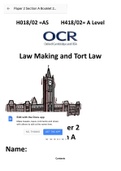Paper 2 Section A Booklet 2…
H018/02 =AS H418/02= A Level
Law Making and Tort Law
Edit with the Docs app
Make tweaks, leave comments and share
with others to edit at the same time.
NO, THANKS
OCR Paper 2
GET THE APP
Section A
Name:
Contents
,Check list ………………………………………………………………..........................2
Topic 1: Parliamentary Law Making……………………………………………………….3
Topic 2: Law Commission …………………………………………………........................11
Topic 3: Delegated Legislation ………………………………………………..............15
Topic 4: Statutory Interpretation ……………………………………………….............20
Topic 5: Judicial Precedent ………………………………………………………….30
Topic 6: European Union Law ……………………………………………………………36
Section A: Example Questions …………………………………………………………..41
Section A – Law Making- Checklist
Parliamentary law ● Influences on parliament; Political, public opinion, media, pressure
making groups and lobbyists
● Legislative process- Green and white papers, different types of bill,
legislative stages in the House of Commons and the House of Lords, role
of the Crown
● Advantages and Disadvantages of influences on law-making
● Advantages and Disadvantages of legislative process
Law Reform ● Law reform including the Law Commission
● Advantages and Disadvantages of law reform bodies
Delegated ● Types of delegated legislation; Orders in Council, statutory instruments
Legislation and by-laws
● Controls on delegated legislation by Parliament and the courts, and
their effectiveness
● Reasons for the use of delegated legislation
● Advantages and Disadvantages of delegated legislation
Statutory ● Rules of statutory interpretation- the literal rule, the golden rule, the
Interpretation mischief rule, the purposive approach
● Aids to interpretation: rules of language, intrinsic and extrinsic aids
● Impact of European Union Law and the Human rights Act 1998 on
statutory interpretation
● Advantages and disadvantages of the different approaches and aids to
statutory interpretation
Judicial precedent ● The doctrine of judicial precedent, stare decisis
● The key features: ratio decidendi and obiter dicta, the hierarchy of the
courts including the Supreme Court, types- binding, persuasive and
original precedent
● Ways of avoiding precedent; overruling reversing; distinguishing
● Advantages and disadvantage of precedent
European Union Law ● Institutions of the European Union
● Sources of European Union Law
● Impact of European Union law on the law of England and Wales
Parliamentary law Making: Influences on Parliament
The UK is a democratic state. This dictates that laws should be made by an elective body (a body voted for by
the public). In the UK this is Parliament, made up of the House of Commons, the House of Lords and the
Crown (the Queen) all acting together.
House of Commons
, House of Commons
The members of the House of Commons are elected by the electorate. The country is divided into
constituencies and each of these votes for one Member of Parliament (MP).
House of Lords
The House of Lords is not elected. Instead, the Lords are appointed.
● 92 hereditary peers (before there were 750)
● About 640 life peers, appointed based on their expertise in medicine, politics, education etc.
● The 26 most senior bishops in the Church of England.
Influences on Parliament
There are many influences on Parliament which can prompt the introduction of a new law.
Political influence
Arguably the largest influence on parliament is the political influence. Each political party will write a
manifesto before an election. This will include what laws they propose to create if they are elected. Following
the election the party with a majority will make up the Government and they have the ability to introduce Bills,
which will likely be passed. The Prime Minister will write a speech for the Queen setting out the bills to be
introduced during that Parliamentary session, usually once a year. For example, the LASPO Act 2012 was
introduced by the Government achieving the political aim to cut public spending.
Media and public opinion
Another large influence on the creation of new laws is the media and public opinion. The media report on key
events across the country and covers different ways in which information is reported such as TV, radio,
newspapers and magazines. More recently it includes information on the internet and especially social media.
All of these forms of media inform the public, represent public opinion and help form public opinion.
As a result of significant events the media can start campaigns and with enough public support can influence
Parliament to create new laws. A famous example was the successful campaign by the News of the World who
influenced ‘Sarah’s Law’ which allows parents/ guardians and carers to enquire with police about suspicious
individuals. Campaigns are particularly effective when the Government is nearing the end of their term and
are hoping to keep favour with the public to be elected again. For example, the SnowDrop Campaign was
formed following the Dunblane Massacre which prompted the Labour Government to introduce the Firearms
(Amendment) (No.2) Act 1997.
Pressure groups
Pressure groups are groups of people who have similar ideas and campaigns for changes in the law. They can
range from just a few people to large groups with hundreds of thousands of members.
Sectional pressure groups represent the interests of particular groups in society and promote the interests of
their members. These groups can influence new laws and are often consulted during the legislative process,
for their expert opinion. For example, the British Medical Association was influential in the Health Act 2006,
banning smoking in public places.
Cause pressure groups exist to promote a particular cause, idea or belief. For example Amnesty International
promotes Human Rights, whilst Greenpeace promotes environmental issues. They often have campaigns to
propose changes in the law. For example, the League Against Cruel Sports was successful in pressuring the
Government to ban fox hunting with dogs under the Hunting Act 2004. Some have been very controversial




